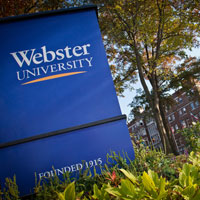Webster Named as One of the Best Missouri Universities for Earning a Top Degree at an Affordable Price
October 23, 2019

WalletHub named Webster University as the second-best university in Missouri, the 36th best university in the Midwest, and the 159th best university in the United States for undergraduate students who want to earn the best degree at the lowest possible cost.
The national analysis of more than 1,000 institutions of education was published online this week. WalletHub is an online organization that monitors credit reports and offers news and advice about investments, savings and payroll data.
“Completing a degree or certification is a proven pathway to improved lives for our graduates and stronger communities where they live and work,” said Webster University Chancellor Elizabeth (Beth) J. Stroble. "Yet, the financial pressures on students and their families can be a barrier to earning a degree. To help our diverse, talented students succeed, we provide strong academic resources, direct financial support, and programs of financial literacy that build their success through graduation and beyond."
To determine the top-performing schools at the lowest possible costs to undergraduates, WalletHub analyzed 33 key measures across seven key dimensions: student selectivity, cost and financing, faculty resources, campus safety, campus experience, educational outcomes and career outcomes.
Webster University was listed as the second-best university out of 25 institutions of higher education in Missouri, just below Washington University in St. Louis. Webster was ranked 36th out of 264 institutions in the Midwest category. Nationally, Webster was list 159th out of 1,003 institutions included in the WalletHub analyses.
Webster earned its best rankings in campus safety (24th in the nation), faculty resources available to students (43rd in the nation) and educational outcomes (185th in the nation).
“Our alumni frequently cite the ease of access they had to faculty and the quality of instruction received in the classroom as one of the main reasons for the success they earned in the professional workforce,” said Webster University President Julian Schuster. “We recognize that many students already have financial obligations which may be detrimental to completing their studies in a timely manner. Webster’s approach is to work with students in meeting their challenges and opening new opportunities.”
Webster University is frequently cited by national publications and reports for its affordability and value. In late August, Washington Monthly magazine released its list of the best universities in the country and listed Webster for “Best Bang for Your Buck: Midwest Region (Social Mobility Ranking)” list. Webster was ranked as the 11th best institution in Missouri for social mobility (out of 37 state institutions) and as the 13th best among all its regional peers in the Midwest.
The 2020 U.S. News & World Report rankings list Webster on its “Best Value” category, “Least Debt, Class of 2018” list, and for “Social Mobility.” The “Social Mobility” list reviewed the graduation rates of Pell Grant recipients to non-Pell Grant recipients to determine which institutions best serve the needs of Pell students. Overall, Webster University was ranked at 17 on the U.S. News & World Report “2020 Best Colleges” ranking among Regional Midwest Universities.
Webster offers a generous amount of financial aid awarded to 98% of full-time undergraduate students – an average of $16,879 in institutional grants or scholarships per student according to the U.S. Department of Education. Last year, Webster increased the overall amount of aid to students by nearly $2.2 million in the past year as part of this commitment to helping students.
After graduation, the typical Webster student has less student debt than graduates from other peer institutions, and almost all Webster students end up repaying their student loans, according to data from the U.S. Department of Education.
Additionally, Webster offers numerous financial literacy programs throughout the year, such as its “Money Talks” sessions where students could learn more about how to better manage their finances, the free “financial wellness” assessments offered through Prudential, and the one-on-one appointments with financial aid counselors available throughout the year.
Last month, the Webster University Board of Trustees announced a tuition freeze for undergraduate and graduate students for the 2020-2021 academic year as a way to further help reduce educational costs.
